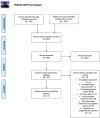Prevalence of cognitive impairment and change in patients with breast cancer: A systematic review of longitudinal studies
- PMID: 33533166
- PMCID: PMC8248098
- DOI: 10.1002/pon.5623
Prevalence of cognitive impairment and change in patients with breast cancer: A systematic review of longitudinal studies
Abstract
Objective: Patients with breast cancer face cognitive impairment that affects their quality of life; partially attributable to treatment. Our aim was to detail the prevalence and change of cognitive impairment during the course of treatment. We also investigated the effect of therapy (chemotherapy [CT]) vs. radiotherapy and/or endocrine therapy vs. healthy controls).
Methods: This article reviews longitudinal cohort studies published to date in Medline and Embase that (i) assess cognition before and after therapy, (ii) report prevalence cognitive impairment or change, and (iii) use standardized and valid neuropsychological tests. We used the original authors' criteria for cognitive impairment.
Results: The title and abstract of 891 articles were screened, resulting in the identification of 90 potentially relevant articles while applying the eligibility criteria. After full-text examination, 17 studies were included. Prevalence of cognitive impairment range from 25% before therapy, through 24% after therapy to 21% at maximal 1-year follow-up (FU). Compared to their pretreatment cognitive functioning, 24% of patients decline after treatment and 24% at 1-year FU. Some studies also reported cognitive improvement showing that 15% and 31% of patients improve, respectively. In general, patients undergoing CT have a higher chance of cognitive impairment and decline than no-CT patients and healthy controls.
Conclusions: This study shows that one out of four breast cancer patients shows cognitive impairment prior to treatment administration CT and a significant number of patients decline during the course of disease, suggesting that cognitive impairment is not exclusively related to CT and/or no-CT therapies. This study shows that assessment of cognitive functioning, ideally over time, is crucial and may help the implementation of personalized rehabilitation pathways.
Keywords: cancer; cancer-related cognitive impairment; chemotherapy-related cognitive impairment; longitudinal studies; mamma carcinoma; oncology.
© 2021 The Authors. Psycho-Oncology published by John Wiley & Sons Ltd.
Conflict of interest statement
The authors declare that there is no conflict of interests.
Figures



References
-
- Bray F, Ferlay J, Soerjomataram I, Siegel RL, Torre LA, Jemal A. Global Cancer Statistics 2018: GLOBOCAN estimates of incidence and mortality worldwide for 36 cancers in 185 countries. CA Cancer J Clin. 2018;68(6):394‐424. http://doi.wiley.com/10.3322/caac.21492 - DOI - PubMed
-
- Bodai B. Breast cancer survivorship: a comprehensive review of long‐term medical issues and lifestyle recommendations. Perm J. 2015;19(2):48‐79. http://www.thepermanentejournal.org/issues/2015/spring/5831-breast-cance... - PMC - PubMed
-
- Collins B, MacKenzie J, Tasca GA, Scherling C, Smith A. Cognitive effects of chemotherapy in breast cancer patients: a dose‐response study. Psychooncology. 2013;22(7):1517‐1527. http://doi.wiley.com/10.1002/pon.3163 - DOI - PubMed
-
- van Dam FSAM, Boogerd W, Schagen SB, et al. Impairment of cognitive function in women receiving adjuvant treatment for high‐risk breast cancer: high‐dose versus standard‐dose chemotherapy. J Natl Cancer Inst. 1998;90(3):210‐218. https://academic.oup.com/jnci/article-lookup/doi/10.1093/jnci/90.3.210 - DOI - PubMed
-
- O’Farrell E, Smith A, Collins B. Objective‐subjective disparity in cancer‐related cognitive impairment: does the use of change measures help reconcile the difference? Psychooncology. 2017;26(10):1667‐1674. http://doi.wiley.com/10.1002/pon.4190 - DOI - PubMed
Publication types
MeSH terms
LinkOut - more resources
Full Text Sources
Other Literature Sources
Medical

